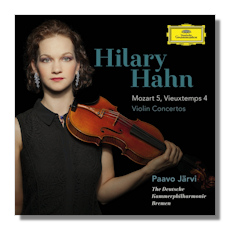
The Internet's Premier Classical Music Source
Related Links
-
Mozart Reviews
Vieuxtemps Reviews - Latest Reviews
- More Reviews
-
By Composer
-
Collections
DVD & Blu-ray
Books
Concert Reviews
Articles/Interviews
Software
Audio
Search Amazon
Recommended Links
Site News
 CD Review
CD Review
Violin Concertos

- Wolfgang Mozart: Violin Concerto #5 in A Major, K. 219
- Henri Vieuxtemps: Violin Concerto #4 in D minor, Op. 31
Hillary Hahn, violin
German Chamber Philharmonic, Bremen/Paavo Järvi
Deutsche Grammophon 4793956
Hilary Hahn never hesitated to bring unusual couplings in her discs. For her most recent Deutsche Grammophon release, combining Mozart's Fifth Violin Concerto with Vieuxtemps' Fourth, there is however a simple explanation. As she writes in the liner notes, she became acquainted with both concertos at a significant moment in her career. The Vieuxtemps was the last major piece she studied with Klara Berkovich, who had been her teacher for five years. The Mozart was the first she learned with Jascha Brodsky who had just become her professor for 7 years at the Curtis Institute for Music. Brodsky himself had been taught by Eugène Isaÿe, star-pupil of Vieuxtemps. She was 10 and ever since these works have been pillars of Hahn's active repertory.
Perhaps it was this lifelong respect for the scores which kept her from giving their full due on disc. I heard Hahn perform the Vieuxtemps Forth in concert with the Berlin Philharmonic last year and if memory serves well it was a much more exciting performance than the one recorded here in the studio with the Deutsche Kammerphilharmonie Bremen (dating from August 2013). At least in the concert we didn't have to wait until the final movement before imagination and expressive freedom join the trademark tonal beauty and technical mastery to kick the piece really alive. The preceding Scherzo with its leaden pace is underwhelming.
Paavo Järvi's accompaniment is detailed but as often with him distant and bland. The Bremen ensemble sounds thin and cannot muster the necessary drama nor these dark tones which the music needs. It suffices to compare with Itzhak Perlman's recording with the Orchestre de Paris under Daniel Barenboim. But then again they opted for a full-blooded romantic approach, while in Hahn's case it never becomes clear which way they wanted to go.
The Vieuxtemps Fourth Concerto isn't recorded much and as Hahn reminds us performing it is for most ensembles a discovery. It could have been a (re)discovery for us as well, but I for one rather stick with the old Perlman and Heifetz recordings.
The Mozart Concerto isn't a big revelation either. The playing is vivid and attacks are firm (Allegro aperto), yet for somebody this long familiar with the work, in spite of the formal beauty, Hahn stays curiously outside of the music (Adagio). I don't feel a real common sense of purpose between soloist and conductor. The Joachim cadenza in the first movement is performed with a romantic emphasis which doesn't connect with the surrounding accompaniment. In the end you end up damning this whole period performance movement and the fallout it had on traditional orchestras. In the old days they might have over-romanticized classics like this, but at least everybody was on the same track.
Copyright © 2015, Marc Haegeman





















